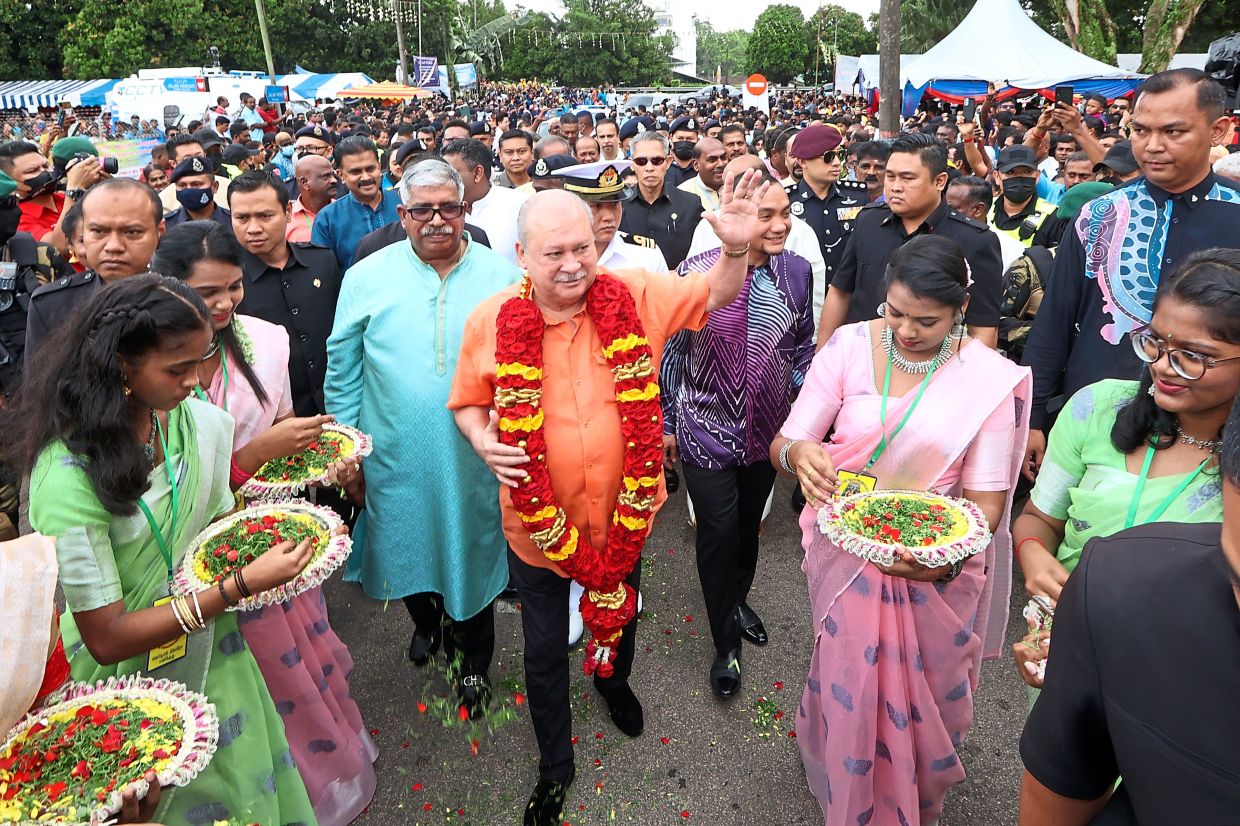
Showing the way: Sultan Ibrahim (centre, in red) arriving at the state-level Thaipusam celebration at a temple in Skudai on Feb 5, along with other Johor state officials. — THOMAS YONG/The Star
IT makes perfect religious sense. There’s absolutely nothing contentious about the Johor religious affairs committee announcing a fatwa (religious decree) advising Muslims against participating in rituals of other faiths.
Other beliefs would echo that sentiment too. As a Christian, I certainly wouldn’t take part in a Thaipusam ritual or hold joss sticks when I attend a Taoist funeral.
When my Muslim friends pray, I would do the same in my own way. It’s done differently, of course, but the objective is the same in all prayers, which is always to ask for the best.
It is Taoist tradition to attend the Qingming festival, or tomb sweeping day, to honour the departed, especially family members, and I do so but refrain from engaging in the rituals.
We live in a multi-religious and multiracial country, so for most of us it would be disrespectful to stay away. Nothing can stop me from attending these important events, even if they could be religious in nature, and I think most of us are unwavering in our own faiths.
But it was the lack of clarity that led to some minor confusion. Johor Ruler Sultan Ibrahim Ibni Almarhum Sultan Iskandar had to issue a statement to clarify the matter.
It was a case of Johor exco member Mohd Fared Mohd Khalid not clearly answering questions posed by reporters at a press conference, even though the statement was precise. It became more confusing when State Mufti Yahya Ahmad reportedly said Muslims in Johor were barred from “observing” Thaipusam processions under the fatwa.
Observing and participating are two different things entirely. It was ambiguous because observing could also be interpreted as participating.
If it meant keeping away, then it would certainly be impractical because there would be Muslim policemen and Rela officers involved in crowd control.
For that matter, even Muslim reporters and photographers would be assigned to cover the event. Also, there would be Muslim onlookers when the processions pass through the streets, for example.
But Yahya could have been misquoted in the article, or perhaps something was lost in translation, or this was simply down to poor writing by the news portal.
His Majesty must be commended for not shying away from attending a luncheon hosted by the Indian community in conjunction with the Thaipusam celebrations at a temple in Skudai, Johor Baru.
He was joined by Johor Mentri Besar Datuk Onn Hafiz Ghazi; state Tourism, Environment, Culture and Heritage Committee chairman Raven Kumar; and state Health and Unity Committee chairman Ling Tian Soon.
Sultan Ibrahim later reaffirmed the “Bangsa Johor” concept, saying the racial and religious diversity of Johor will always be recognised and respected.
His Majesty rightly said the fatwa issued by the Johor Islamic Reli-gious Council was in no way in conflict with interfaith values of tolerance, unity and understanding as espoused under the “Bangsa Johor” concept.
“The fatwa only prohibits Muslims from taking part in other religious rituals. It is a guideline for them. They can still attend festive events of other faiths.
“Other religions must also respect Muslims’ sensitivities. It is a two-way street. We must be sensitive to each other’s religious obligations to get along,” His Majesty said.
It’s important for our leaders to attend events involving other faiths, even if it’s something symbolic like a simple lunch or tea during Christmas, or just to break fast with Muslims during Ramadan.
If Malaysians have no problem embracing public holidays to celebrate the festivals of other faiths, then we should be rejoicing the occasions together as Malaysians.
If these national leaders are unable to attend, then they should at least have the decency to send a senior representative.
But there shouldn’t be lame excuses. These politicians seem to be quite happy to show up at places of worship to canvas for votes during elections but suddenly can’t make an appearance when the polls are over.
They can give an excuse once, but let’s see if similar justifications are concocted in the following years.
The Council of Churches Malaysia (CCM) must be commended for lauding the guidelines provided by the Johor authorities.
CCM general secretary Rev Jonathan Jesudas said non-Muslims should appreciate the limits that Muslims are subject to under syariah laws when inviting Muslim colleagues or friends to their festivities or celebrations.
“The clarity provided by the Johor Islamic religious affairs committee is welcome and will definitely promote greater harmony and interaction among the various religious communities in Malaysia,” he said.
Rev Jonathan also noted how Malaysians from various religious communities would join each other in celebrating religious festivals.
“Open houses are definitely a signature practice of Malaysians where all will visit one another, enjoy delicacies and the hospitality of their neighbours and friends who are celebrating.
“This is so much a part of life that in our joy, we hardly stop and recognise that this is religious harmony and tolerance.
“It is also the cement which holds the Malaysian community together, distinguishing us from the other nations in the world,” he said.
The most important reminder came from the Sultan of Johor, when he said that it’s better to emphasise the commonalities and values of all religions than dwell on their differences.
Again, it looks like we must depend on our Rulers to drive common sense home into our politicians’ heads.
Daulat Tuanku!





